-
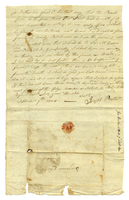 Joseph Porter to Benjamin Chew, September 07, 1800
Joseph Porter to Benjamin Chew, September 07, 1800 Porter writes to Chew advising the birth of a child to enslaved woman Lucy, but the baby did not survive. There is mention of Dr. Sikes- it appears Lucy asked after him but it is unclear whether she was denied care or not. Porter was also approached by "Gentleman Jimmy Morris" and asked if there were "any young negro girls to be sold either for a tirm [sp] of years or else for life". Porter suggests Lucy now that she is "clear of a child". There is mention of Prince and Merrit as well.
-
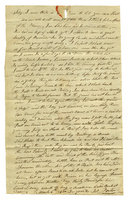 Joseph Porter to Benjamin Chew, March 06, 1800
Joseph Porter to Benjamin Chew, March 06, 1800 Porter advises that he has hired Jude at Dover, also mentions Jake, Prince and Beck.
-
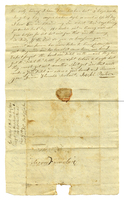 Joseph Porter to Benjamin Chew, June 19, 1798
Joseph Porter to Benjamin Chew, June 19, 1798 Porter advises that Mrs. Raymond is cutting of trousers for Sharper, Enos, Lemon, young Jim, Aaron, and Cato, and that new pairs will also be needed for old Jim [Jem?] and Dick as the linen shrunk in their washing.
-
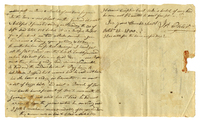 Joseph Porter to Benjamin Chew, October 28, 1800
Joseph Porter to Benjamin Chew, October 28, 1800 Letter stating that the enslaved people need linen for clothing. Porter also notes that Peg has been sent back to Whitehall upon the death of Simon Vanwinkle.
-
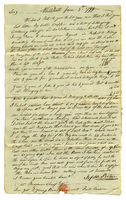 Joseph Porter to Benjamin Chew, Jr. listing enslaved children of Whitehall, June 08, 1799
Joseph Porter to Benjamin Chew, Jr. listing enslaved children of Whitehall, June 08, 1799 Names and ages of Black children including Phene [Phin], Ham, twins Rach and Lusy [Rachel and Lucy], and Jim, their mother being Lusy [Lucy]; Grace, Jake, Lid, and Bet belonging to Nan; and Tillie and Tish belonging to Little Sal. All ranging between 10 years to 4 months old, for "a total 12 head".
-
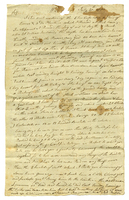 Joseph Porter to Benjamin Chew on the death of enslaved man, July 20, 1800
Joseph Porter to Benjamin Chew on the death of enslaved man, July 20, 1800 Letter advising that "Lemmon" [Lemon] died of old age the Tuesday evening prior. The doctor saw him, but there was nothing he could do.
-
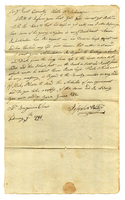 Joseph Porter to Benjamin Chew, February 09, 1798
Joseph Porter to Benjamin Chew, February 09, 1798 Letter stating George Ford, the former overseer, has not returned with the horse but his wife is still there, and also that Aaron drew a knife on Porter and threatened his life. He states that "some of the young Negroes is very disobediant" before singling out Aaron.
-
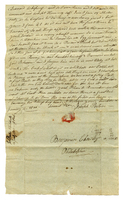 Joseph Porter to Benjamin Chew, Jr., January 14, 1800
Joseph Porter to Benjamin Chew, Jr., January 14, 1800 Porter writing to Chew to let him know that "there has Been sme Disturbance between me & the young hands that is Jim & Yarm". Another potentially violent altercation between Porter and the two enslaved men, resulting in the whipping of both Jim (Jem?) and Yarm.
-
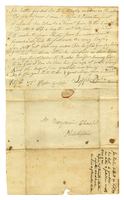 Joseph Porter to Benjamin Chew, Jr., February 20, 1799
Joseph Porter to Benjamin Chew, Jr., February 20, 1799 Letter discussing Priscilla's three children, including 18 year old Lucy hired out to a silversmith in Dover and Beck at " a leven or twelve" to Mrs. Parkes of Dover for two years "for her vittels & cloathes" - there is discussion of others wanting to purchase her. The third child is a one year old boy named Charles. Also addressed is Prince's desire to purchase his wife Rachel, asking how long she must serve and how much Chew will take for her.
-
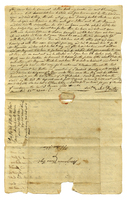 Joseph Porter to Benjamin Chew, Jr. regarding an altercation resulting in punishment of Yarm, November 28, 1800
Joseph Porter to Benjamin Chew, Jr. regarding an altercation resulting in punishment of Yarm, November 28, 1800 Letter about altercation between Yarm and Porter in which Yarm resisted direct orders, proceeding to choke Porter. The letter is damaged from the original seal, but Cato is mentioned, possibly trying to pull them apart. Yarm received 26 lashes after Mr. Raymond is called upon. Raymond also suggesting Yarm is sold or hired out. David is also mentioned, as well as possibly Aaron. The letter also specified that Yarm is the son of Merrit, labeling them a "Devlish Family".
-
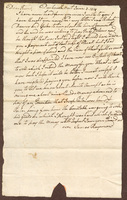 George Ford to Benjamin Chew regarding sickness and insolence amongst the enslaved people at Whitehall, November 06, 1797
George Ford to Benjamin Chew regarding sickness and insolence amongst the enslaved people at Whitehall, November 06, 1797 Letter stating that "the people" are in "in bad want of ther shoes and linnen" [sic]. He specifically names Enos, Dick, Aaron and James, and that he bought shoes for them. Ford also notes fever in the town and sickness at Whitehall, including muliple hands were sick at the same time. He singles out Cato and then the workers as a whole, saying "he [Cato] has not done any work sence harvest The people were very endlent and sloughfull about ther work it has put us very backward in our besiness" [sic]. Ford lost one of his children from his sickness as well.
-
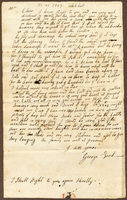 George Ford to Benjamin Chew, December 23, 1797
George Ford to Benjamin Chew, December 23, 1797 Letter asking Chew to come down - enslaved boys are running about at night and wearing out their shoes. Ford describes them as stubborn, presumably when they are told not to do so, and gives him "sacy" (sp? sassy?) language. Possibly in Benjamin Chew Jr.'s hand, there is a note on the letter reading "negroes becoming negligent".
-
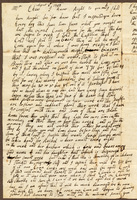 George Ford to Benjamin Chew regarding patterns of resistance by enslaved workers, August 03, 1797
George Ford to Benjamin Chew regarding patterns of resistance by enslaved workers, August 03, 1797 Ford begins his letter explaining that they are behind on the harvest and states that "the people are so slow and indlent (?) about ther work that I have no comfort with them." Ford specifies that the women "are not worth ther vitles for what work they do" [sic]. Ford singles out Rachel and her daughter as well: "Rachel is hear amust every night in the weak and her husband which is free and bears avery bad name and her daughter heet which is bignough [big enough] to dow smart werk but insted of thatis levenine up in idelness" [sic].
-
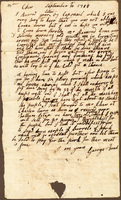 George Ford to Benjamin Chew regarding correction of two enslaved men, September, 12 1795
George Ford to Benjamin Chew regarding correction of two enslaved men, September, 12 1795 Letter stating that "Mr. Ramond" (James Raymond) came to Whitehall to assist Ford in correcting enslaved men Aaron and Jim. The letter advises that they were tied and whipped. Aaron threatened Ford's life, Ford stating "he would kill me which I make no dout but he will try to do if he cold get a chance" [sic].
-
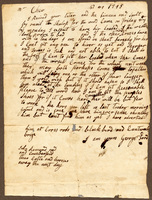 George Ford to Benjamin Chew, November 29, 1795
George Ford to Benjamin Chew, November 29, 1795 Letter stating that Sharper and James are sick, advising that it will hinder the harvest (presumably of wheat). Ford also inquires about "the peoples shoes", suggesting that only few will be able to work if bad weather comes.
-
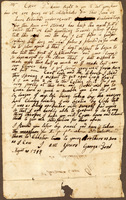 George Ford to Benjamin Chew after attack by enslaved people, August 20, 1795
George Ford to Benjamin Chew after attack by enslaved people, August 20, 1795 Letter asking Benjamin Chew to come down because Ford was attacked and threatened by the enslaved workers . Ford states that the he is "in danger of my life being taken by the neagores. Last Thusday evinine I was beatin by clobs tell I was as blody as a bucher with severel bad wonds so that I am hardly able to go about to see any things" [sic].
Ford asks Chew to correct them to give him satisfaction for "ther abuse I recived" [sic].
-
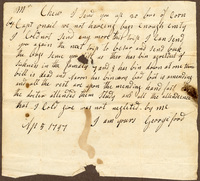 George Ford to Benjamin Chew on sickness at Whitehall, April 05, 1797
George Ford to Benjamin Chew on sickness at Whitehall, April 05, 1797 Ford states that there has been a "gret deel of sickness in the famaly" [sic]. Bill is dead and Aaron has been very sick but is on the mend. Seven to eight workers have been infirmed at once, but all are also "amending". The doctor has been to Whitehall attend them.
-
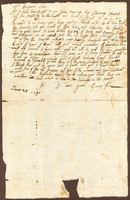 George Ford to Benjamin Chew, December 25, 1790
George Ford to Benjamin Chew, December 25, 1790 Letter in which Ford advises Chew that he has parted with two horses and "four of the women and two children are putout", but does not specify who.
-
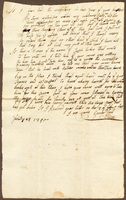 George Ford to Benjamin Chew, February 28, 1790
George Ford to Benjamin Chew, February 28, 1790 Letter on the hire of Joseph Tucker, a friend or acquaintance of Matthew Weeks, to help with the harvest.
-
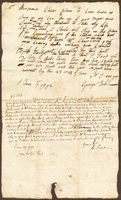 George Ford to Benjamin Chew asking for "correction" of enslaved men, June 19, 1792
George Ford to Benjamin Chew asking for "correction" of enslaved men, June 19, 1792 Letter asking Benjamin Chew to come down to Whitehall because Ford was attacked and threatened by an enslaved worker, stating that "one of your negro men teased me and threatened to take my Life." Ford also says that "one of the others" had "misbehaved" and wants Chew to have them "corrected" so this behavior towards him does not "corrupt the others".
This document includes a copy of Chew's response, stating that he will send Mr. Raymond to let the first man and "all the negroes" know that he will be coming down to Whitehall to punish him and "chastise" all the others.
-
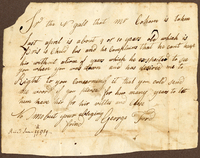 George Ford to Benjamin Chew on hiring out of enslaved girl, September 29, 1789
George Ford to Benjamin Chew on hiring out of enslaved girl, September 29, 1789 Letter on the hire of Priscilla's 9 or 10 year old daughter to Mr. Cohoon. Cohoon is asking for confirmation on how long he can "keep hir" [sic].
-
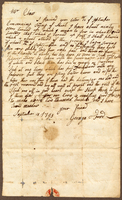 George Ford to Benjamin Chew, September 13, 1793
George Ford to Benjamin Chew, September 13, 1793 Letter discussing sickness at Whitehall, specifically fever, and its effect on the work and productivity on the plantation. Ford states as many as 14 workers were sick at one time. Even the horses were sick with "distemper", one of them dying.
-
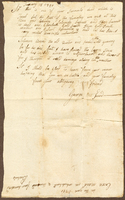 George Ford to Benjamin Chew, January 15, 1790
George Ford to Benjamin Chew, January 15, 1790 Letter on the death of servant Jacob and others in the neighborhood.
-
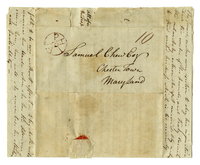 Benjamin Chew Jr. & Sr. to Samuel Chew regarding sale of Whitehall to George Kennard, 1803
Benjamin Chew Jr. & Sr. to Samuel Chew regarding sale of Whitehall to George Kennard, 1803 Letter to Samuel Chew on the sale of Whitehall to George Kennard and "Liberation of the Blacks in a short period".
-
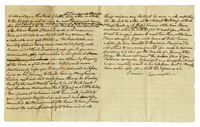 Benjamin Chew, Jr. to unknown regarding sale of Whitehall, December 25, 1802
Benjamin Chew, Jr. to unknown regarding sale of Whitehall, December 25, 1802 Letter to unknown about the sale of Whitehall, mentioning the reputation of the "Black People" and that they would, essentially, come with the purchase, noting that many of them are young. He writes, "The Reputation of the Black People I trust is such as to recommend them and it will be an object with me to secure them a valuable and good Master" .
 Joseph Porter to Benjamin Chew, September 07, 1800 Porter writes to Chew advising the birth of a child to enslaved woman Lucy, but the baby did not survive. There is mention of Dr. Sikes- it appears Lucy asked after him but it is unclear whether she was denied care or not. Porter was also approached by "Gentleman Jimmy Morris" and asked if there were "any young negro girls to be sold either for a tirm [sp] of years or else for life". Porter suggests Lucy now that she is "clear of a child". There is mention of Prince and Merrit as well.
Joseph Porter to Benjamin Chew, September 07, 1800 Porter writes to Chew advising the birth of a child to enslaved woman Lucy, but the baby did not survive. There is mention of Dr. Sikes- it appears Lucy asked after him but it is unclear whether she was denied care or not. Porter was also approached by "Gentleman Jimmy Morris" and asked if there were "any young negro girls to be sold either for a tirm [sp] of years or else for life". Porter suggests Lucy now that she is "clear of a child". There is mention of Prince and Merrit as well. Joseph Porter to Benjamin Chew, March 06, 1800 Porter advises that he has hired Jude at Dover, also mentions Jake, Prince and Beck.
Joseph Porter to Benjamin Chew, March 06, 1800 Porter advises that he has hired Jude at Dover, also mentions Jake, Prince and Beck. Joseph Porter to Benjamin Chew, June 19, 1798 Porter advises that Mrs. Raymond is cutting of trousers for Sharper, Enos, Lemon, young Jim, Aaron, and Cato, and that new pairs will also be needed for old Jim [Jem?] and Dick as the linen shrunk in their washing.
Joseph Porter to Benjamin Chew, June 19, 1798 Porter advises that Mrs. Raymond is cutting of trousers for Sharper, Enos, Lemon, young Jim, Aaron, and Cato, and that new pairs will also be needed for old Jim [Jem?] and Dick as the linen shrunk in their washing. Joseph Porter to Benjamin Chew, October 28, 1800 Letter stating that the enslaved people need linen for clothing. Porter also notes that Peg has been sent back to Whitehall upon the death of Simon Vanwinkle.
Joseph Porter to Benjamin Chew, October 28, 1800 Letter stating that the enslaved people need linen for clothing. Porter also notes that Peg has been sent back to Whitehall upon the death of Simon Vanwinkle. Joseph Porter to Benjamin Chew, Jr. listing enslaved children of Whitehall, June 08, 1799 Names and ages of Black children including Phene [Phin], Ham, twins Rach and Lusy [Rachel and Lucy], and Jim, their mother being Lusy [Lucy]; Grace, Jake, Lid, and Bet belonging to Nan; and Tillie and Tish belonging to Little Sal. All ranging between 10 years to 4 months old, for "a total 12 head".
Joseph Porter to Benjamin Chew, Jr. listing enslaved children of Whitehall, June 08, 1799 Names and ages of Black children including Phene [Phin], Ham, twins Rach and Lusy [Rachel and Lucy], and Jim, their mother being Lusy [Lucy]; Grace, Jake, Lid, and Bet belonging to Nan; and Tillie and Tish belonging to Little Sal. All ranging between 10 years to 4 months old, for "a total 12 head". Joseph Porter to Benjamin Chew on the death of enslaved man, July 20, 1800 Letter advising that "Lemmon" [Lemon] died of old age the Tuesday evening prior. The doctor saw him, but there was nothing he could do.
Joseph Porter to Benjamin Chew on the death of enslaved man, July 20, 1800 Letter advising that "Lemmon" [Lemon] died of old age the Tuesday evening prior. The doctor saw him, but there was nothing he could do. Joseph Porter to Benjamin Chew, February 09, 1798 Letter stating George Ford, the former overseer, has not returned with the horse but his wife is still there, and also that Aaron drew a knife on Porter and threatened his life. He states that "some of the young Negroes is very disobediant" before singling out Aaron.
Joseph Porter to Benjamin Chew, February 09, 1798 Letter stating George Ford, the former overseer, has not returned with the horse but his wife is still there, and also that Aaron drew a knife on Porter and threatened his life. He states that "some of the young Negroes is very disobediant" before singling out Aaron. Joseph Porter to Benjamin Chew, Jr., January 14, 1800 Porter writing to Chew to let him know that "there has Been sme Disturbance between me & the young hands that is Jim & Yarm". Another potentially violent altercation between Porter and the two enslaved men, resulting in the whipping of both Jim (Jem?) and Yarm.
Joseph Porter to Benjamin Chew, Jr., January 14, 1800 Porter writing to Chew to let him know that "there has Been sme Disturbance between me & the young hands that is Jim & Yarm". Another potentially violent altercation between Porter and the two enslaved men, resulting in the whipping of both Jim (Jem?) and Yarm. Joseph Porter to Benjamin Chew, Jr., February 20, 1799 Letter discussing Priscilla's three children, including 18 year old Lucy hired out to a silversmith in Dover and Beck at " a leven or twelve" to Mrs. Parkes of Dover for two years "for her vittels & cloathes" - there is discussion of others wanting to purchase her. The third child is a one year old boy named Charles. Also addressed is Prince's desire to purchase his wife Rachel, asking how long she must serve and how much Chew will take for her.
Joseph Porter to Benjamin Chew, Jr., February 20, 1799 Letter discussing Priscilla's three children, including 18 year old Lucy hired out to a silversmith in Dover and Beck at " a leven or twelve" to Mrs. Parkes of Dover for two years "for her vittels & cloathes" - there is discussion of others wanting to purchase her. The third child is a one year old boy named Charles. Also addressed is Prince's desire to purchase his wife Rachel, asking how long she must serve and how much Chew will take for her. Joseph Porter to Benjamin Chew, Jr. regarding an altercation resulting in punishment of Yarm, November 28, 1800 Letter about altercation between Yarm and Porter in which Yarm resisted direct orders, proceeding to choke Porter. The letter is damaged from the original seal, but Cato is mentioned, possibly trying to pull them apart. Yarm received 26 lashes after Mr. Raymond is called upon. Raymond also suggesting Yarm is sold or hired out. David is also mentioned, as well as possibly Aaron. The letter also specified that Yarm is the son of Merrit, labeling them a "Devlish Family".
Joseph Porter to Benjamin Chew, Jr. regarding an altercation resulting in punishment of Yarm, November 28, 1800 Letter about altercation between Yarm and Porter in which Yarm resisted direct orders, proceeding to choke Porter. The letter is damaged from the original seal, but Cato is mentioned, possibly trying to pull them apart. Yarm received 26 lashes after Mr. Raymond is called upon. Raymond also suggesting Yarm is sold or hired out. David is also mentioned, as well as possibly Aaron. The letter also specified that Yarm is the son of Merrit, labeling them a "Devlish Family". George Ford to Benjamin Chew regarding sickness and insolence amongst the enslaved people at Whitehall, November 06, 1797 Letter stating that "the people" are in "in bad want of ther shoes and linnen" [sic]. He specifically names Enos, Dick, Aaron and James, and that he bought shoes for them. Ford also notes fever in the town and sickness at Whitehall, including muliple hands were sick at the same time. He singles out Cato and then the workers as a whole, saying "he [Cato] has not done any work sence harvest The people were very endlent and sloughfull about ther work it has put us very backward in our besiness" [sic]. Ford lost one of his children from his sickness as well.
George Ford to Benjamin Chew regarding sickness and insolence amongst the enslaved people at Whitehall, November 06, 1797 Letter stating that "the people" are in "in bad want of ther shoes and linnen" [sic]. He specifically names Enos, Dick, Aaron and James, and that he bought shoes for them. Ford also notes fever in the town and sickness at Whitehall, including muliple hands were sick at the same time. He singles out Cato and then the workers as a whole, saying "he [Cato] has not done any work sence harvest The people were very endlent and sloughfull about ther work it has put us very backward in our besiness" [sic]. Ford lost one of his children from his sickness as well. George Ford to Benjamin Chew, December 23, 1797 Letter asking Chew to come down - enslaved boys are running about at night and wearing out their shoes. Ford describes them as stubborn, presumably when they are told not to do so, and gives him "sacy" (sp? sassy?) language. Possibly in Benjamin Chew Jr.'s hand, there is a note on the letter reading "negroes becoming negligent".
George Ford to Benjamin Chew, December 23, 1797 Letter asking Chew to come down - enslaved boys are running about at night and wearing out their shoes. Ford describes them as stubborn, presumably when they are told not to do so, and gives him "sacy" (sp? sassy?) language. Possibly in Benjamin Chew Jr.'s hand, there is a note on the letter reading "negroes becoming negligent". George Ford to Benjamin Chew regarding patterns of resistance by enslaved workers, August 03, 1797 Ford begins his letter explaining that they are behind on the harvest and states that "the people are so slow and indlent (?) about ther work that I have no comfort with them." Ford specifies that the women "are not worth ther vitles for what work they do" [sic]. Ford singles out Rachel and her daughter as well: "Rachel is hear amust every night in the weak and her husband which is free and bears avery bad name and her daughter heet which is bignough [big enough] to dow smart werk but insted of thatis levenine up in idelness" [sic].
George Ford to Benjamin Chew regarding patterns of resistance by enslaved workers, August 03, 1797 Ford begins his letter explaining that they are behind on the harvest and states that "the people are so slow and indlent (?) about ther work that I have no comfort with them." Ford specifies that the women "are not worth ther vitles for what work they do" [sic]. Ford singles out Rachel and her daughter as well: "Rachel is hear amust every night in the weak and her husband which is free and bears avery bad name and her daughter heet which is bignough [big enough] to dow smart werk but insted of thatis levenine up in idelness" [sic]. George Ford to Benjamin Chew regarding correction of two enslaved men, September, 12 1795 Letter stating that "Mr. Ramond" (James Raymond) came to Whitehall to assist Ford in correcting enslaved men Aaron and Jim. The letter advises that they were tied and whipped. Aaron threatened Ford's life, Ford stating "he would kill me which I make no dout but he will try to do if he cold get a chance" [sic].
George Ford to Benjamin Chew regarding correction of two enslaved men, September, 12 1795 Letter stating that "Mr. Ramond" (James Raymond) came to Whitehall to assist Ford in correcting enslaved men Aaron and Jim. The letter advises that they were tied and whipped. Aaron threatened Ford's life, Ford stating "he would kill me which I make no dout but he will try to do if he cold get a chance" [sic]. George Ford to Benjamin Chew, November 29, 1795 Letter stating that Sharper and James are sick, advising that it will hinder the harvest (presumably of wheat). Ford also inquires about "the peoples shoes", suggesting that only few will be able to work if bad weather comes.
George Ford to Benjamin Chew, November 29, 1795 Letter stating that Sharper and James are sick, advising that it will hinder the harvest (presumably of wheat). Ford also inquires about "the peoples shoes", suggesting that only few will be able to work if bad weather comes. George Ford to Benjamin Chew after attack by enslaved people, August 20, 1795 Letter asking Benjamin Chew to come down because Ford was attacked and threatened by the enslaved workers . Ford states that the he is "in danger of my life being taken by the neagores. Last Thusday evinine I was beatin by clobs tell I was as blody as a bucher with severel bad wonds so that I am hardly able to go about to see any things" [sic]. Ford asks Chew to correct them to give him satisfaction for "ther abuse I recived" [sic].
George Ford to Benjamin Chew after attack by enslaved people, August 20, 1795 Letter asking Benjamin Chew to come down because Ford was attacked and threatened by the enslaved workers . Ford states that the he is "in danger of my life being taken by the neagores. Last Thusday evinine I was beatin by clobs tell I was as blody as a bucher with severel bad wonds so that I am hardly able to go about to see any things" [sic]. Ford asks Chew to correct them to give him satisfaction for "ther abuse I recived" [sic]. George Ford to Benjamin Chew on sickness at Whitehall, April 05, 1797 Ford states that there has been a "gret deel of sickness in the famaly" [sic]. Bill is dead and Aaron has been very sick but is on the mend. Seven to eight workers have been infirmed at once, but all are also "amending". The doctor has been to Whitehall attend them.
George Ford to Benjamin Chew on sickness at Whitehall, April 05, 1797 Ford states that there has been a "gret deel of sickness in the famaly" [sic]. Bill is dead and Aaron has been very sick but is on the mend. Seven to eight workers have been infirmed at once, but all are also "amending". The doctor has been to Whitehall attend them. George Ford to Benjamin Chew, December 25, 1790 Letter in which Ford advises Chew that he has parted with two horses and "four of the women and two children are putout", but does not specify who.
George Ford to Benjamin Chew, December 25, 1790 Letter in which Ford advises Chew that he has parted with two horses and "four of the women and two children are putout", but does not specify who. George Ford to Benjamin Chew, February 28, 1790 Letter on the hire of Joseph Tucker, a friend or acquaintance of Matthew Weeks, to help with the harvest.
George Ford to Benjamin Chew, February 28, 1790 Letter on the hire of Joseph Tucker, a friend or acquaintance of Matthew Weeks, to help with the harvest. George Ford to Benjamin Chew asking for "correction" of enslaved men, June 19, 1792 Letter asking Benjamin Chew to come down to Whitehall because Ford was attacked and threatened by an enslaved worker, stating that "one of your negro men teased me and threatened to take my Life." Ford also says that "one of the others" had "misbehaved" and wants Chew to have them "corrected" so this behavior towards him does not "corrupt the others". This document includes a copy of Chew's response, stating that he will send Mr. Raymond to let the first man and "all the negroes" know that he will be coming down to Whitehall to punish him and "chastise" all the others.
George Ford to Benjamin Chew asking for "correction" of enslaved men, June 19, 1792 Letter asking Benjamin Chew to come down to Whitehall because Ford was attacked and threatened by an enslaved worker, stating that "one of your negro men teased me and threatened to take my Life." Ford also says that "one of the others" had "misbehaved" and wants Chew to have them "corrected" so this behavior towards him does not "corrupt the others". This document includes a copy of Chew's response, stating that he will send Mr. Raymond to let the first man and "all the negroes" know that he will be coming down to Whitehall to punish him and "chastise" all the others. George Ford to Benjamin Chew on hiring out of enslaved girl, September 29, 1789 Letter on the hire of Priscilla's 9 or 10 year old daughter to Mr. Cohoon. Cohoon is asking for confirmation on how long he can "keep hir" [sic].
George Ford to Benjamin Chew on hiring out of enslaved girl, September 29, 1789 Letter on the hire of Priscilla's 9 or 10 year old daughter to Mr. Cohoon. Cohoon is asking for confirmation on how long he can "keep hir" [sic]. George Ford to Benjamin Chew, September 13, 1793 Letter discussing sickness at Whitehall, specifically fever, and its effect on the work and productivity on the plantation. Ford states as many as 14 workers were sick at one time. Even the horses were sick with "distemper", one of them dying.
George Ford to Benjamin Chew, September 13, 1793 Letter discussing sickness at Whitehall, specifically fever, and its effect on the work and productivity on the plantation. Ford states as many as 14 workers were sick at one time. Even the horses were sick with "distemper", one of them dying. George Ford to Benjamin Chew, January 15, 1790 Letter on the death of servant Jacob and others in the neighborhood.
George Ford to Benjamin Chew, January 15, 1790 Letter on the death of servant Jacob and others in the neighborhood. Benjamin Chew Jr. & Sr. to Samuel Chew regarding sale of Whitehall to George Kennard, 1803 Letter to Samuel Chew on the sale of Whitehall to George Kennard and "Liberation of the Blacks in a short period".
Benjamin Chew Jr. & Sr. to Samuel Chew regarding sale of Whitehall to George Kennard, 1803 Letter to Samuel Chew on the sale of Whitehall to George Kennard and "Liberation of the Blacks in a short period". Benjamin Chew, Jr. to unknown regarding sale of Whitehall, December 25, 1802 Letter to unknown about the sale of Whitehall, mentioning the reputation of the "Black People" and that they would, essentially, come with the purchase, noting that many of them are young. He writes, "The Reputation of the Black People I trust is such as to recommend them and it will be an object with me to secure them a valuable and good Master" .
Benjamin Chew, Jr. to unknown regarding sale of Whitehall, December 25, 1802 Letter to unknown about the sale of Whitehall, mentioning the reputation of the "Black People" and that they would, essentially, come with the purchase, noting that many of them are young. He writes, "The Reputation of the Black People I trust is such as to recommend them and it will be an object with me to secure them a valuable and good Master" .